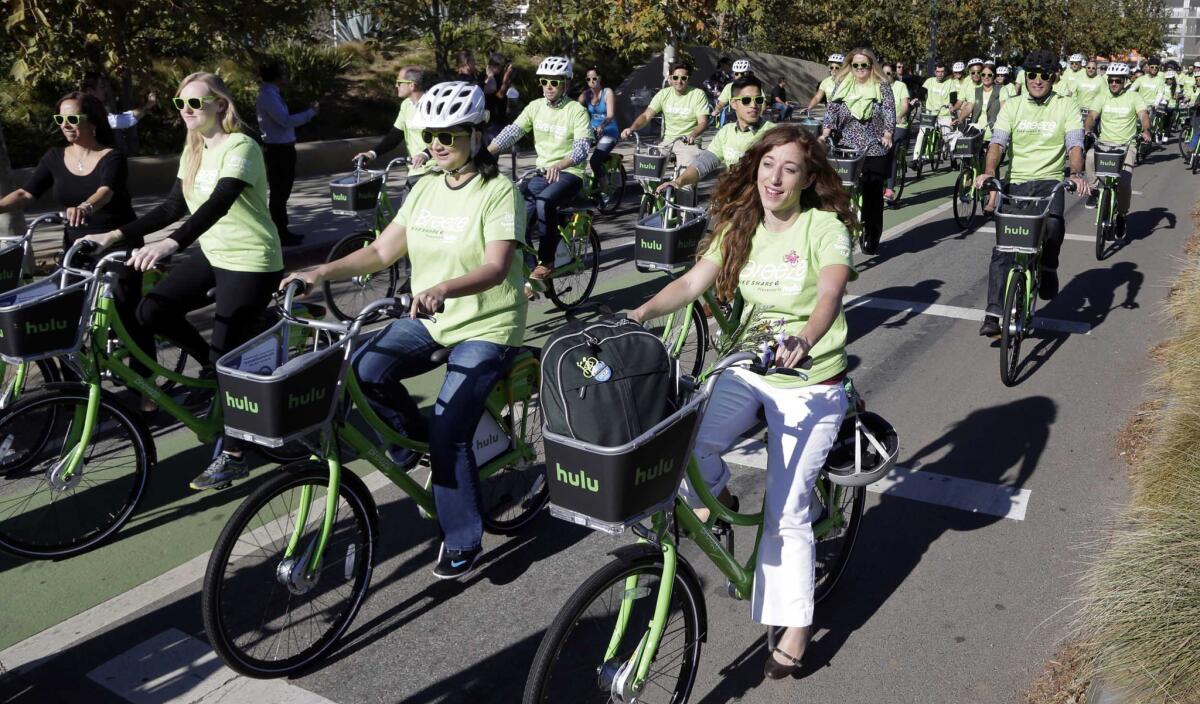Mark your calendars: Bike-share will launch in downtown L.A. on July 7

- Share via
After years of planning and delays, Los Angeles will finally see the launch of its own bike-sharing system.
Starting July 7, nearly 1,000 bicycles will be available for short-term rentals at 65 kiosks placed near downtown Los Angeles transit stops and destinations, including Union Station, the Arts District and the Broad museum.
The $11-million program, backed by the Metropolitan Transportation Authority, will add Los Angeles to the growing number of cities that have welcomed bike-sharing as an affordable, convenient way to make short trips without a car.
See the most-read stories this hour >>
Like other bike-sharing systems, L.A.’s program is designed for short, point-to-point trips, rather than all-day rentals. Users will pay at a kiosk, pull a bicycle out of an adjacent rack, hop on, and drop the bike off at a rack near their destination.
“It’s really going to help people combine transit trips and bicycle trips,” Metro spokesman Dave Sotero said.
The program could translate well to sprawling Los Angeles County, where many residents don’t live or work within easy walking distance of a bus stop or rail station.
Closing that so-called “first mile, last mile” gap could make the system more efficient for current users and more attractive for commuters who aren’t using the growing rail system, officials say.
Riders will be able to pay to rent bicycles with their Metro fare cards. A one-way ride of a half-hour or less will cost $3.50. Users who buy a monthly or annual pass will pay lower rates.
To boost membership sales, Metro will make bicycles available only to pass holders until Aug. 1.
As might be expected in a region that includes 88 cities, bike-share’s rollout took longer than expected. Los Angeles has been discussing the idea since 2012, when then-Mayor Antonio Villaraigosa announced plans for a system that were scuttled less than a year later.
In 2014, Metro began its own plans for a system that would have a more regional scope.
Last year, Santa Monica and Long Beach moved ahead with plans for their own systems rather than wait for the planned Metro system to reach them. Santa Monica has said that launching ahead of the debut of the Expo Line extension was critical to the light-rail line’s success.
That raised some concern that dual systems could confuse tourists in areas like Venice Beach, where Los Angeles brushes against Santa Monica.
Metro officials plan to add bicycles in Pasadena next year, and are considering expansions to Hollywood, East Los Angeles and the San Fernando Valley.
Bike-share will also come to USC after Los Angeles finishes a curb-separated bicycle lane along Figueroa Street, planned for 2017, said Metro deputy executive officer Laura Cornejo.
Metro and Los Angeles shared the $5.2 million cost to set up the downtown program, including buying 1,000 bicycles. Operating the system will cost an estimated $2.6 million a year for the next two years.
Officials also hope a corporate sponsor could underwrite some costs, but haven’t publicly named one. Santa Monica’s program is sponsored by Hulu. The New York City system, CitiBike, is partially funded by CitiBank.
For pass holders paying $20 per month, trips shorter than a half-hour will be free. Each half-hour period after that will cost $1.75 — the same as a one-way Metro bus or rail fare.
For $40 per year, trips shorter than a half-hour will cost $1.75.
Riders who don’t want to sign up for a membership will pay $3.50 for each half-hour period.
MORE LOCAL NEWS
Condoms, tampons and feces: Oregon fraternity suspended after ‘disgraceful’ trashing of Shasta Lake
Expo Line, meet the real world: A car on tracks, a broken-down train
The huge price tag for missing warnings of L.A. teachers abusing students: $300 million and counting
For more transportation news, follow @laura_nelson on Twitter.
More to Read
Sign up for Essential California
The most important California stories and recommendations in your inbox every morning.
You may occasionally receive promotional content from the Los Angeles Times.














